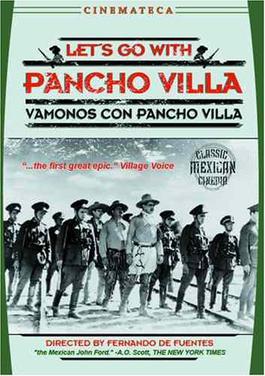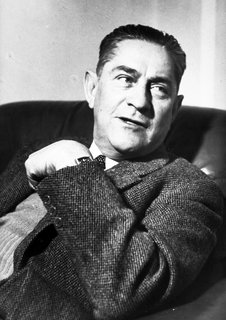Plot
The film is a part of the trilogy of films made by Fernando Fuentes concerning the Mexican Revolution, the other two films being El compadre Mendoza (1934) and Vámonos con Pancho Villa (1936).
The film centers on the drunkard Colonel Carrasco, whose wife Marta leaves him taking his young son. The child, Juan, grows into an admirable and well-mannered young man. Having been promoted to a higher rank of power amidst the Mexican Revolution, the indulgent and corrupt Colonel accepts a bribe to free a revolutionary, Felipe Martinez, from his prison. Martinez has been sentenced to execution at the hands of a firing squad. Carrasco asks to have the revolutionary replaced by absolutely anyone. In a twist of fate, that anyone turns out to be his own long lost son Juan. Upon receiving this news, Marta races to the prison and explains the predicament to Carrasco. He subsequently desperately attempts to prevent the gunning down of his son by his very own government officials.

Mexican literature is one of the most prolific and influential of Spanish-language literatures along with those of Spain and Argentina. Found among the names of its most important and internationally recognized literary figures are authors Octavio Paz, Alfonso Reyes, Carlos Fuentes, Sergio Pitol, José Emilio Pacheco, Rosario Castellanos, Fernando del Paso, Juan Rulfo, Amado Nervo, Sor Juana Inés de la Cruz, Ramón López Velarde, and Carlos de Sigüenza y Góngora, among others.

Let's Go with Pancho Villa is a Mexican motion picture directed by Fernando de Fuentes in 1936, the last of the director's Revolution Trilogy, besides El prisionero trece and El compadre Mendoza.

Duck, You Sucker!, also known as A Fistful of Dynamite and Once Upon a Time ... the Revolution, is a 1971 epic Zapata Western film directed and co-written by Sergio Leone and starring Rod Steiger, James Coburn, and Romolo Valli.

Amor en silencio is a Mexican telenovela produced by Carla Estrada for Televisa in 1988. Its first broadcast was in Mexico in 1988 and then made its debut in Latin America, Europe, Asia and, in a unique situation, it was broadcast in the United States by Telemundo during primetime. It can be said that this is the only Televisa telenovela that was never shown on Univision. Back then Telemundo got the rights to Amor en silencio and Pasión y poder, the latter one got picked up by Univision in 1993 as daytime programming.

The Revolutionary Mexicanist Action, better known as the Gold Shirts, was a Mexican fascist, secular, anti-Semitic, anti-communist, ultra-nationalist paramilitary organization, originated in September 1933 in Mexico City and operated until disbanded in 1936. With ultra-nationalist, strikebreaking roots and Nazi German support, the organization sought to expel Chinese, Jews, and communists from Mexico. The organization often violently engaged with labor movements associated with the Mexican Communist Party and with labor strikers.

Nicolás Rodríguez Carrasco was a Mexican general, revolutionary, and the founder and leader of the fascist paramilitary organization Revolutionary Mexicanist Action, better known as the Gold Shirts.

Villa Rides is a 1968 American Technicolor Western war film in Panavision directed by Buzz Kulik and starring Yul Brynner as Mexican revolutionary Pancho Villa and Robert Mitchum as an American adventurer and pilot of fortune. The screenplay is based on the biography by William Douglas Lansford. The supporting cast includes Charles Bronson as Fierro, Herbert Lom as Huerta and Alexander Knox as Madero.
Vicente Carrillo Fuentes, commonly referred to by his alias El Viceroy, is a Mexican convicted drug lord and former leader of the Juárez Cartel, a drug trafficking organization. The cartel is based in Chihuahua, one of the primary transportation routes for billions of dollars' worth of illegal drug shipments entering the United States from Mexico annually. He was one of Mexico's most-wanted drug lords until his capture in 2014.

Fernando de Fuentes Carrau was a Mexican film director, considered a pioneer in the film industry worldwide. He is perhaps best known for directing the films El prisionero trece, El compadre Mendoza, and Vámonos con Pancho Villa, all part of his Revolution Trilogy on the Mexican Revolution.
Godfather Mendoza is a 1934 Mexican film. It was directed by Fernando de Fuentes, and is the second of his Revolution Trilogy, preceded by El prisionero trece (1933) and followed by Vámonos con Pancho Villa (1936).

El fantasma del convento is a 1934 Mexican horror film directed by Fernando de Fuentes, who also co-wrote and edited the film.

Emma Roldán was a Mexican character actress and costume designer. She is remembered as the sharp-tongued, domineering matron of Mexican cinema, and was nominated three times for a Silver Ariel Award.
The Revolution Trilogy is a series of 1930s movies about the Mexican Revolution by Fernando de Fuentes. The three movies are El prisionero trece (1933), El compadre Mendoza (1934) and Vámonos con Pancho Villa (1936). All three share a disenchanted view of the conflict, as opposed to the more common romantic, folk, and heroic viewpoints present in more well-known productions.
Events in the year 1999 in Mexico.

El ministerio del tiempo is a Spanish fantasy television series created by Javier and Pablo Olivares and produced by Onza Partners and Cliffhanger for Televisión Española (TVE). It premiered on 24 February 2015 on TVE's main channel La 1. The series follows the exploits of an investigative team in the fictional Ministry of Time, which deals with incidents caused by time travel that can cause changes to the present day.
Juan Charrasqueado is a 1948 Mexican Western film directed by Ernesto Cortázar. It stars Pedro Armendáriz, Miroslava, and Fernando Soto. The film's sets were designed by the art director Francisco Marco Chillet.
María José is a Mexican telenovela produced by Juan Osorio for Televisa in 1995.
Bailando 2016 is the eleventh season of Bailando por un Sueño. The season premiere aired on 30 May 2016, on El Trece. However, the competition started a day later, on 31 May. Marcelo Tinelli, once again, was the host for the show's.

Sonatas is a 1959 Mexican-Spanish historical drama film directed by Juan Antonio Bardem and starring María Félix, Francisco Rabal and Aurora Bautista. It premiered at the Venice Film Festival. It is based on novels written by the Spanish author Ramón del Valle-Inclán.
The Second Honduran Civil War or the Reclamation Revolution was the armed conflict that took place in the Republic of Honduras in 1924. This was the first conflict in Honduras where airplanes were used for aerial bombardment, and new war tactics inherited from the First World War were employed.











